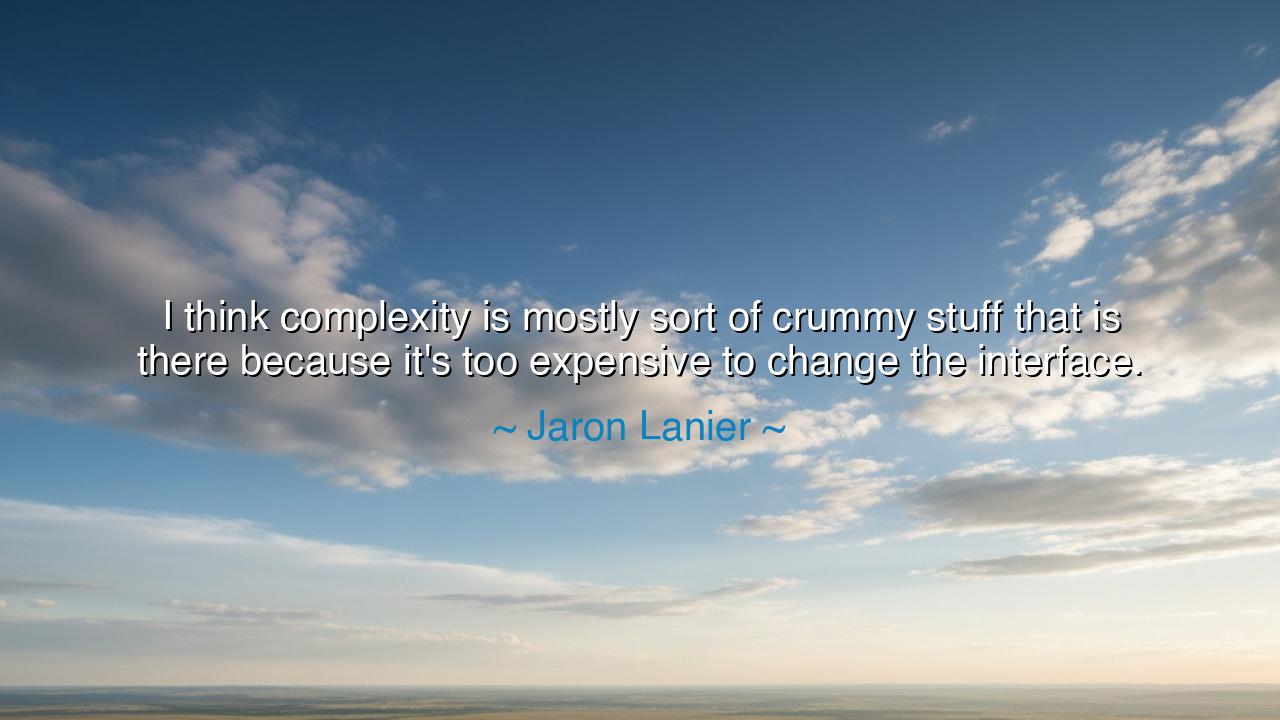
I think complexity is mostly sort of crummy stuff that is there
I think complexity is mostly sort of crummy stuff that is there because it's too expensive to change the interface.






Hear the unvarnished truth of Jaron Lanier, seer of the digital age, who declared: “I think complexity is mostly sort of crummy stuff that is there because it’s too expensive to change the interface.” In these words is a lament against the false weight of needless complication, the layers of confusion that grow not from wisdom, but from neglect, fear, and the cost of correction. He reminds us that much of what men call sophistication is not born of vision, but of compromise—patches upon patches, left standing because the price of clarity seemed too high.
In ages past, tools were simple, and their interfaces were born of necessity. The plow was a handle and a blade, the lyre strings and wood, the pen a quill dipped in ink. The user and the tool met in direct intimacy. But as systems grew vast and intertwined, as machines became bound to codes and networks, a creeping complexity arose. Often this was not the fruit of deep design, but of convenience: it was easier to add than to rebuild, cheaper to pile on than to renew. Thus, Lanier saw the truth—what we mistake for progress is sometimes only the sediment of decisions deferred.
Consider the story of the Roman aqueducts. They were marvels of engineering—graceful, efficient, and lasting centuries. But when the empire began to decay, repairs were neglected. Instead of restoring the elegant arches, the Romans often made crude additions, temporary fixes, hasty patches. The waters still flowed, but the beauty was lost, and eventually the structure itself crumbled. So too in our age of technology: when interfaces are not remade, but endlessly patched, the system grows monstrous, fragile, and ugly. Complexity becomes a prison rather than a tool.
Lanier’s words also strike at the heart of human psychology. We cling to what we have built, fearing the cost of tearing it down to start anew. Companies hesitate to change because of expense, institutions because of inertia, individuals because of habit. But what is not changed festers; what is not rebuilt decays. The crummy stuff of life accumulates not only in machines, but in our own ways of living—old patterns, broken traditions, and outdated systems we keep only because it seems too costly to replace them.
The meaning of his words, then, is both technical and spiritual. He warns that complexity is often not a sign of brilliance but of failure—failure to pursue clarity, failure to pay the cost of renewal. True greatness lies not in adding layers of complication, but in daring to reshape the interface, to strip away what is false and reveal what is essential. Just as the finest architecture appears simple yet profound, so the finest systems—of technology, of society, of the soul—are those that are clean, direct, and renewed when needed.
The lesson for us is clear: do not worship complexity for its own sake. When faced with clutter—whether in your work, your relationships, or your technology—ask if it exists because of necessity, or because of fear of change. Be willing to pay the price of renewal, to face the difficulty of rebuilding, so that your creations may be clear and strong rather than tangled and weak. For clarity is costly, but confusion is costlier still.
Therefore, beloved seeker, take action. Simplify where you can. Do not shy away from tearing down what no longer serves, even if the effort is great. Strive always for interfaces—between people, between tools, between ideas—that reveal truth rather than obscure it. For in such simplicity lies strength, and in such clarity lies freedom.
Thus the voice of Jaron Lanier endures: “Complexity is mostly crummy stuff, left because it is too expensive to change the interface.” Let it be for you both warning and call to courage. For the brave will not accept needless complexity, but will strive for renewal—paying the price for clarity, so that what they build will endure, beautiful and strong, for generations to come.






AAdministratorAdministrator
Welcome, honored guests. Please leave a comment, we will respond soon